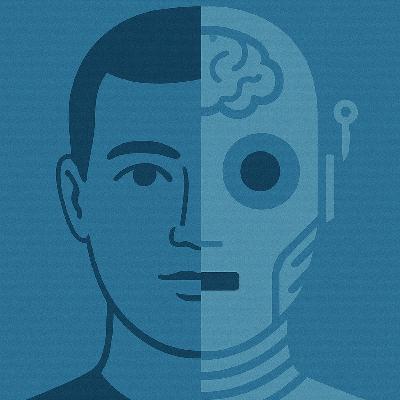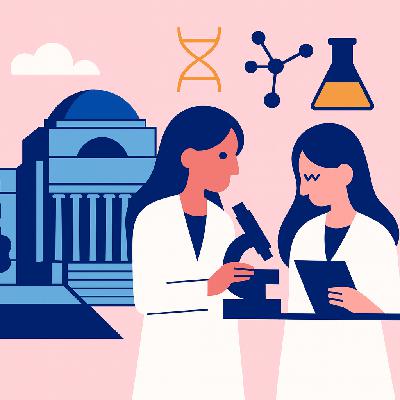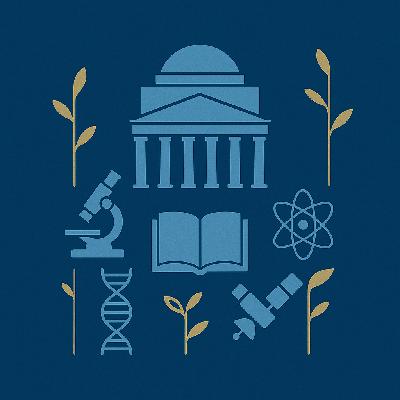Discover Vis a Vis
Vis a Vis

Vis a Vis
Author: Columbia University Libraries
Subscribed: 12Played: 12Subscribe
Share
© 2021 Vis a Vis
Description
"Vis a Vis" is a new podcast produced by the Alliance Program at Columbia University. "Vis a Vis" will feature conversations that challenge our understanding of key global, economic and social issues by casting them in a transatlantic perspective. The "Vis a Vis" podcast will interrogate and contrast the perspectives of Columbia faculty with their French and European counterparts, focusing on a range of issues of urgent concern, including: climate change, migration, freedom of expression, diversity, the politics of memory, the role of culture in society, AI and the future of work, democracy and social media, participatory democracy... Guests will include a broad diversity of Columbia faculty, researchers, doctoral students, as well as French professors and scholars visiting Columbia under the Alliance Program.
32 Episodes
Reverse
In 2027, we will be celebrating the 100th anniversary of the Big Bang theory, first proposed by the Belgivan priest and astronomer Georges Lemaître. In the last 100 years, our knowledge and understanding of the universe has been radically transformed. Back in 1917, Einstein still believed in a static universe. Then came Edwin Hubble, who demonstrated,…
Politics, today, seems to be divided by ideology, as much as it is by identity. Our political leanings are determined, not only by our particular vision of the common good, but by who we are, where we come from, and the groups we belong to. One way to understand the degree to which identity shapes…
By all accounts, the AI revolution is upon us and, although we know it will transform our world, its long-term impact – on jobs, on education, on privacy, on our political life – can only be surmised with some degree of prudence. While applications of artificial intelligence in the worlds of transport, communications, and medicine…
Every year, 1.3 million babies are born with congenital heart disease worldwide. One third of them need an artificial valve implant. These complex heart surgeries save hundreds of thousands of babies’ lives every year. But valve implants are not a perfect solution. New valves need to be implanted every few years, which requires multiple operations…
When the French writer Marcel Proust died at the age of 51 more than a century ago, many obituaries highlighted the fact that his mother was Jewish. But Proust’s relationship with his Jewish side was complex and many critics and readers of his masterwork, In Search of Lost Time, perceive signs of self-hatred and even antisemitism…
When we think about works of philosophy, sociology, history, or economics, we often think of rigorous, methodically argued tomes written in arid, dispassionate prose. Social science enquiry aims to deliver clear, objective knowledge about the human world, not beautifully written narratives. In fact, we tend to be suspicious of social science and humanities works that…
In June 2024, the French Far Right party, the National Rally came in first at the European elections, way ahead of the party of President Macron. This sent shockwaves in the French political world and Emmanuel Macron decided to dissolve the National Assembly and call for early legislative elections. On June 30th, the National Rally won 33% of the…
Over the last 80 years, research has been at the core of scientific and technological progress in our societies; and universities have played and continue to play a critical role in this process. At Columbia University, research offers a critical pathway to build new knowledge and practical solutions that impact people’s lives in significant ways.…
Over the last decades, the world of cinema has gone through profound transformations. The advent of streaming platforms, the COVID pandemic, and the introduction of AI technology at multiple stages of film production all contributed to create a new landscape which raises many questions about cinema in the future. Will cinema theaters thrive again or…
On April 15th, 2019, the world saw in awe the Notre Dame Cathedral ravaged by flames. As the fire spread through the beloved Paris landmark, toxic smoke spewed billions of particles of lead from the collapsing roof and spire. In the weeks that followed the disaster, experts and civil society groups raised the alarm about…
In Woody Allen’s 2011 movie Midnight in Paris, Gil, a young Hollywood screenwriter and aspiring novelist, played by Owen Wilson, is transported back to the 1920s Paris. Every night, he meets his heroes, Hemingway, F Scott Fitzgerald, Djuna Barnes, Gertrude Stein. He encounters a cast of artists like Picasso, Luis Buñuel, Salvador Dáli, Man Ray. Soon,…
In most areas of our lives, artificial intelligence is promising to bring revolutionary change – from medicine to transport, from education to food production. Even creative industries – filmmaking, music, and the visual arts – will not be spared. We are all aware that we are part of a huge experiment: indeed, we contribute, willy-nilly,…
Artificial intelligence is revolutionizing the way we work, the way we stay informed, the way we interact with others. It is also set to transform the way we move around in cities. In the air, electric vertical take-off and landing vehicles – eVTOLs – (or air taxis) are already being tested, promising to take passengers…
Over the last few years, the rise of artificial intelligence has been reshaping many areas of our lives. From healthcare to law, from self-driving cars to self-written novels, AI promises to transform our relationship with the world and remodel our interactions with our fellow human beings. In the area of climate research, AI is proving to be a powerful tool. In particular, the use of AI to develop powerful predictive models – even for such elusive and seemingly random phenomena as precipitations – can provide scientists and policy makers with tools that can help mitigate the effects of climate change and generate strategies to adapt to its consequences.
Since the storming of the Capitol on January 6th 2021, there have been growing fears about the risk of political violence in the United States. Efforts to cast doubt on the results of the election, combined with the spread of inflammatory rhetoric and increased polarization on social media, represent serious threats, not only to civility, but…
Today, the average American teen spends 7 hours and 22 minutes looking at screens each day (an increase of 30% in the last 10 years). At the same time, 7 out of 10 teens say they often or sometimes feel more peaceful when they don’t have their smartphone. The surgeon-general recently called for a warning label on social…
Since September 11th 2001, there have been close to 150 Islamic terrorist attacks in Europe. But in order to understand the phenomenon of jihadism, one has to look beyond the attacks themselves. The periods of high tide, justifiably, grab public and media attention. But we need to focus on jihadist networks at periods of low tide…
Today, March 4th 2024, France becomes the first country in the world to enshrine the right to abortion in its Constitution. In the United States, by contrast, the Supreme Court overturned Roe v Wade in 2022, and ruled that the Constitution does not confer a right to abortion, sending legal and social aftershocks throughout the…
To mark Black History Month, Vis A Vis spoke to Maboula Soumahoro, one of the leading transatlantic thinkers on race, racism and the African Diaspora. While French and American societies struggle against racism, intolerance and discrimination take different forms on each side of the Atlantic. The French republican tradition emphasizes “laïcité” (or secularism) and color-blindness,…
As the United States embarks on a new election cycle, Vis A Vis is looking back on the Obama Presidency for insights on the challenges the country is now facing and how we got here. Last spring saw the launch of the Obama Presidency oral history, an archive of over 400 interviews with Obama cabinet…
























